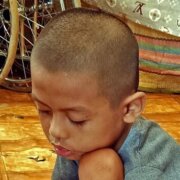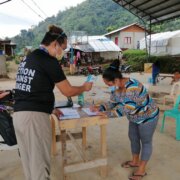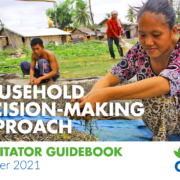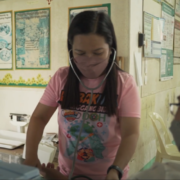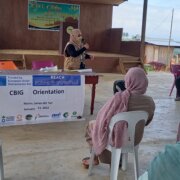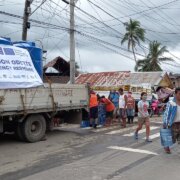ACTION AGAINST HUNGER DELIVERS LIFESAVING AID AFTER TRIPLE STORM EMERGENCY IN THE PHILIPPINES
Within just one week, three consecutive tropical cyclones—Crising, Dante, and Typhoon Emong (internationally named Wipha, Francisco, and Co-may, respectively)—struck the Philippines, affecting 34 provinces across Luzon, Visayas, and some parts of Mindanao. These storms, intensified by the Southwest Monsoon, unleashed widespread flooding, landslides, and destruction, underscoring the growing toll of climate change on the country’s most vulnerable communities.
The compounding impacts have affected an estimated 7.5 million people or over 2 million families according to the Department of Social Welfare and Development[1], with more than 203,000 individuals displaced and nearly 30,000 homes damaged. Typhoon Emong, the strongest among the three, made two landfalls in Pangasinan and Ilocos Sur, submerging towns, destroying farmlands, and cutting off access to basic services.
Since July 22, Action Against Hunger has been actively responding to the crisis through coordinated humanitarian operations and joint rapid needs assessments. Our Mission Emergency Response Team (MERT) in the Philippines was immediately deployed to affected areas in Metro Manila, as well as devastated municipalities in the provinces of Rizal, Bulacan, Bataan, and Pangasinan.
These efforts are being carried out in close collaboration with local stakeholders as well as partners under the ACCESS Consortium with funding from the European Union Humanitarian Aid (ECHO). Emergency response interventions are also being carried out with funding support from the Spanish Agency for International Development Cooperation (AECID).
Department of Social Welfare and Development (2025). DSWD DROMIC Report #26 on the Combined Effects of Southwest Monsoon and Tropical Cyclones “Crising”, “Dante”, and “Emong” as of 30 July 2025, 6AM. Accessed online on 29 July 2025 from https://dromic.dswd.gov.ph/effects-of-southwest-monsoon-and-tropical-depression-crising-17-jul-2025/

In photo: Action Against Hunger MERT visits one of the affected indigenous peoples’ communities in Payangan, Dinalupihan, Bataan. (Photo by Lorena Sanz for Action Against Hunger)
“We didn’t expect the water to rise and reach our house because we live in what’s considered a high area. We let our guard down, so we didn’t move our things to higher ground. But the flood reached us anyway,” said Janice (not her real name), a 44-year-old mother from one of the river-adjacent barangays in the Municipality of Rodriguez (formerly Montalban), Province of Rizal. “I had to carry my 5-year-old child as we made our way to the evacuation center. The water was chest-deep.”

In photo: Barangay Manggahan in Rodiguez, Rizal is covered in thick mud in the aftermath of the flooding that occurred due to the heavy rains caused by the multiple storms and southwest monsoon.(Photo by Tom Lamache for Action Against Hunger)
According to Janice, flooding has become a regular part of their lives. Just last year, during Super Typhoon Carina (international name: Gaemi), the floodwaters rose all the way to their ceiling. “I just want to experience a life where we don’t always have to evacuate whenever it rains,” she added.
With the support of European Union Humanitarian Aid (ECHO), Action Against Hunger activated its Rapid Response Mechanism (RRM) under the ACCESS Project. Through this, we were able to distribute emergency water and hygiene kits to 150 displaced families in Rizal, 67 in Hagonoy, Bulacan, and 25 in Dinalupihan, Bataan by July 30. These distributions were complemented by awareness sessions on water, sanitation, and hygiene (WASH), disease prevention, Protection from Sexual Exploitation and Abuse (PSEA), child safeguarding, and camp coordination and management. Simultaneously, with support from AECID, hygiene kits were distributed to more than 80 families in the province of Rizal. These efforts form part of a broader emergency response in Rizal Province, where Action Against Hunger is set to reach at least 700 families with Multi-Purpose Cash Assistance (MPCA) and additional WASH support.

In photo: Janice unpacks the contents of the WASH kit she received from Action Against Hunger’s AECID-funded emergency response. (Photo by Joyce Sandajan for Action Against Hunger)
Despite these coordinated efforts, assessments highlight deepening vulnerabilities. Many families have lost access to food and income, creating urgent needs for extended food assistance and livelihood recovery. Contaminated water sources, flooded latrines, and the lack of hygiene supplies continue to increase public health risks. Mental health and psychosocial support services remain limited, with few safe spaces and unclear referral pathways for those in distress. Overcrowded shelters have raised protection concerns, including heightened GBV risks, while damaged homes and disrupted schools add further pressure on already vulnerable families.
In the coming weeks, Action Against Hunger will continue conducting rapid needs assessments in underserved areas, especially those not yet reached by other responders. These efforts will inform expanded interventions, including the distribution of hygiene and water kits, hygiene promotion sessions, minor WASH infrastructure repairs in evacuation centers, and sensitization activities on camp coordination and inclusive protection practices. We are committed to ensuring that our humanitarian response is inclusive, gender-sensitive, and responsive to the specific needs of indigenous peoples, women, and persons with disabilities.

In photo: Members of the Ayta Ambala community in Barangay Payangan, Dinalupihan receive WASH kits funded by the EU Humanitarian Aid through ACCESS. (Photo by Beverly Dycoco for Action Against Hunger)
To support long-term recovery, we will scale up emergency food security and livelihood programs, particularly in areas where flooding has disrupted markets and agriculture. We also aim to expand support for WASH facility repairs, mental health and psychosocial services, and GBV mitigation. Recognizing the environmental dimension of the crisis, Action Against Hunger is also working with local partners to integrate waste management and sanitation into a broader WASH strategy, especially in urban flood-prone areas.
Amid increasingly frequent and intense climate-related emergencies, Action Against Hunger remains committed to delivering life-saving, inclusive, and environmentally responsible humanitarian assistance. By working hand-in-hand with local governments, national agencies, humanitarian partners, and affected communities, we strive to bridge critical response gaps and ensure that vulnerable populations are not left behind in the face of growing climate risks.
Check out our latest situation report for more information about our emergency response.



